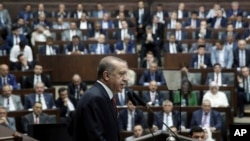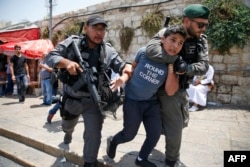Turkish President Recep Tayyip Erdogan has criticized Israel for security measures at the al-Aqsa Mosque, also known as the Temple Mount, in Jerusalem. Rising tensions over the mosque could threaten attempts at rapprochement between Israel and Turkey.
Erdogan chose his weekly address to his parliamentary deputies to launch a strong attack on Israel for the introduction of security measures to access the al-Aqsa mosque in Jerusalem, the third holiest site for Muslims.
Erdogan said Israel's legitimacy makes sense to the extent it respects the rights of itself, Palestine and Palestinians. He said the restrictions on the mosque are not due to safety concerns and that Israel is trying to take al-Aqsa from Muslims under the guise of counterterrorism efforts. Israel has announced the reversal of its decision to install highly visible metal detectors at al-Aqsa entrances. They were installed after Arab gunmen killed two Israeli policemen earlier this month.
Erdogan’s ruling AK party derives much of its support from religious voters and the Turkish president has been trying to position himself as a leader in the wider Muslim world.
On Friday, thousands protested in Istanbul against Israel’s restrictions and controls on accessing the al-Aqsa mosque. Similar large protests have been held in several Turkish provincial cities. Anger in Turkey toward Israel spilled into violence against Istanbul's tiny Jewish community.
Islamic nationalists attacked Neve Shalom, Istanbul’s main synagogue. The attack caused little damage and no injuries, but critics point out police officers normally protecting the synagogue failed to intervene. On Tuesday, Erdogan condemned the synagogue attack.
The president says it does not make sense to attack synagogues here because something has happened at al-Aqsa mosque. He added that it does not suit Islam and it is not allowed.
The rising tensions concerning the al-Aqsa mosque are forcing Erdogan to perform a difficult balancing act. Ankara is in a process of rapprochement with Israel, after relations collapsed in 2010 when Israeli commandos killed nine Turkish citizens trying to break an economic sea blockade of Gaza.
Along with trade, energy cooperation is driving rapprochement efforts.
Up until now a Turkish presidential adviser said the Palestinian issue was compartmentalized from wider relations. With tensions continuing over the al-Aqsa mosque, that compartmentalization policy is facing its stiffest test.





